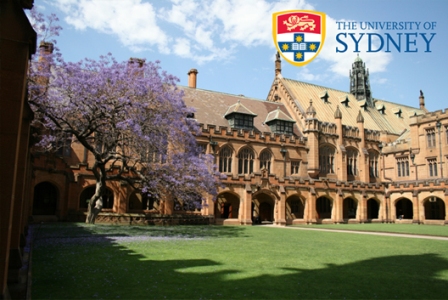Sydney Medical School researchers' comprehensive review: no link between vaccinations and autism
The first systematic international review of childhood vaccinations led by researchers from the University of Sydney has found no evidence of a link to the development of autism or autism spectrum disorders (ASDs).

The comprehensive review, published in medical journal Vaccine, examined five cohort studies involving more than 1.25 million children, an additional five case-control studies involving more than 9,920 children obtained via systematic searches of international medical databases MEDLINE, PubMed, EBASE and Google Scholar up to April 2014.
Both the cohort and case-control studies revealed no statistical data to support a relationship between childhood vaccination for the commonly used vaccines for measles, mumps, rubella, diphtheria, tetanus and whooping cough and the development of autism or ASDs.
Paper senior author Associate Professor Guy Eslick from the Sydney Medical School said these vaccines were the ones that had received the most attention by anti-vaccination groups.
“There has been enormous debate regarding the possibility of a link between these commonly used and safe childhood vaccinations and the supposed development of autism,” Associate Professor Eslick said.
“A rising awareness of autism cases and the claimed but not proven link to childhood vaccinations has led to both an increased distrust in the trade between vaccine benefit outweighing potential risks and an opportunity for disease resurgence.
“This has in recent times become a major public health issue with vaccine-preventable diseases rapidly increasing in the community due to the fear of a ‘link’ between vaccinations and autism.
“This is especially concerning given the fact that there have been 11 measles outbreaks in the US since 2000, and NSW also saw a spike in measles infections from early 2012 to late 2012.
“Vaccine-preventable diseases clearly still hold a presence in modern-day society, and the decision to opt out of vaccination schedules needed to be urgently and properly evaluated.”
Associate Professor Eslick said to date there had been no quantitative data analysis of any relationship between autism, autism spectrum disorders and childhood vaccinations.
“Our review is the first to do so, and we found no statistical evidence to support this idea,” the Sydney Medical School associate professor said.
“Our extensive international review found childhood vaccinations including measles, mumps, rubella, diphtheria, tetanus and whooping cough are not associated with the development of autism or an autism-spectrum disorder.
“Furthermore, our review found the components of the widely used vaccines (thimerosal or mercury), nor the measles, mumps and rubella combination vaccines (MMR) are not associated with the development of autism or an autism-spectrum disorder.
“The increase in parents deciding not to vaccinate their children has substantially decreased ‘herd immunity’ among populations, subsequently increasing the risk of catching potentially more serious infectious diseases.
“Thus the risks incurred by not immunising a child is increasing substantially as the level of immunisation coverage in the population falls.
“The data consistently shows the lack of evidence for an association between autism, autism spectrum disorders and childhood vaccinations, regardless of whether the intervention was through combination vaccines (MMR) or one of its components, providing no reason to avoid immunisation on these grounds.”
University of Sydney Doctor of Medicine
Program: Doctor of Medicine (MD)
Location: Sydney, New South Wales (Camperdown/Darlington campus)
Semester intake: February 2015
Duration: 4 years
Application deadline: July 7, 2014 (10 a.m. Sydney time)*
*In order for your complete Sydney MD application to be submitted on time, all documents must be at the OzTREKK office by Friday, July 4, 2014.
Entry Requirements for the Sydney Medical Program
1. Performance in an undergraduate degree
Students can apply to the Sydney MD if they have completed a bachelor degree in any discipline, and have achieved a grade point average (GPA) of 5.5 out of 7 (or equivalent) from a recognized university. The grade requirement according to Sydney Medical School is equivalent to a GPA of 2.7 out of 4.0.
Sydney Medical School has decided to continue their trial including the results from coursework master degrees in the calculation of the GPA. The trial will be limited to international applicants who are applying in 2014 for enrollment in Sydney medical program in 2015. During the trial, international applicants who hold a master’s degree by coursework as well as a bachelor’s degree will be permitted to either
- nominate their bachelor’s degree for use in the GPA calculation, or
- nominate that both their master’s and their bachelor’s degree be used in the GPA calculation.
Students from a wide variety of undergraduate studies are welcome and encouraged to apply. There are no specific prerequisite undergraduate subjects required for admission into the Sydney MD.
2. Performance in a medical admissions test – MCAT or GAMSAT
Students must achieve a minimum performance in a medical school admissions test:
Most North American-based applicants choose to sit the Medical College Admission Test (MCAT), although international applicants can complete either the MCAT or the Graduate Australian Medical School Admission Test (GAMSAT).
Applicants must meet a minimum level of achievement in the admissions test to be eligible. The minimum score required for the MCAT for the 2015 intake is 8/8/8 or 8/8/M/8. Test results from January 2012 onward will be accepted for applications for the 2015 intake. American students applying to Sydney Medical School are required to sit the MCAT.
3. Performance in an online interview
The Multiple Mini-Interview (MMI) aims to sample a candidate’s competencies in order to gain a more accurate picture of strengths, weaknesses and suitability for the Sydney MD.
Apply now to Sydney Medical School!
*

































Ask A Question
Ask us about your program of interest, or if you have a question about our services.
CONTACT US TODAY